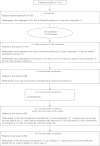Long-term outcomes following vocational rehabilitation treatments in patients with prolonged fatigue
- PMID: 22135188
- PMCID: PMC3576556
- DOI: 10.1007/s12529-011-9208-z
Long-term outcomes following vocational rehabilitation treatments in patients with prolonged fatigue
Abstract
Background: Multi-component vocational rehabilitation (VR) provides positive short-term outcomes in patients with prolonged fatigue.
Purpose: The purpose of this study is to evaluate the long-term outcomes of Dutch multi-component VR up to 18 months after treatment.
Method: In a pre-post-study, measurements were taken before treatment (t0), after treatment (t1) and in long-term follow-ups at 6 (t2), 12 (t3) and 18 months (t4) after treatment. Primary outcomes (fatigue, work participation and workability) and secondary outcomes [physical and social functioning, mental health and heart rate variability (HRV)] were assessed over time using linear mixed models analyses. Post hoc long-term outcomes were compared with t0 and t1.
Results: Sixty patients with severe fatigue complaints participated. The primary outcomes significantly (p < 0.001) improved at follow-ups compared with t0 and showed no relapse compared with t1. Moreover, fatigue decreased (p < 0.002) whereas workability (p < 0.001) and work participation (p < 0.001) increased further after treatment (t1). The secondary outcomes, physical functioning, mental health, social functioning and HRV, improved significantly (p < 0.001, p < 0.001, p < 0.001 and p = 0.049, respectively) over the long term compared with t0. At 6-month follow-up (t2), mental health (p < 0.003) and social functioning (p = 0.003) further increased after the treatment was stopped.
Conclusion: Multi-component VR treatments seem to significantly and in a clinically relevant way decrease fatigue symptoms and improve individual functioning and work participation in patients with severe prolonged fatigue over the long term and without showing relapse.
Figures


Similar articles
-
Process and outcome evaluation of vocational rehabilitation interventions in patients with prolonged fatigue complaints.Int J Behav Med. 2011 Jun;18(2):160-71. doi: 10.1007/s12529-010-9099-4. Int J Behav Med. 2011. PMID: 20499296 Free PMC article.
-
Work-related limitations and return-to-work experiences in prolonged fatigue: workers' perspectives before and after vocational treatment.Disabil Rehabil. 2011;33(23-24):2166-78. doi: 10.3109/09638288.2011.563814. Epub 2011 Mar 29. Disabil Rehabil. 2011. PMID: 21446856
-
Integrated mental health care and vocational rehabilitation to improve return to work rates for people on sick leave because of exhaustion disorder, adjustment disorder, and distress (the Danish IBBIS trial): study protocol for a randomized controlled trial.Trials. 2017 Dec 2;18(1):579. doi: 10.1186/s13063-017-2273-0. Trials. 2017. PMID: 29197404 Free PMC article. Clinical Trial.
-
Systematic reviews of the effectiveness of day care for people with severe mental disorders: (1) acute day hospital versus admission; (2) vocational rehabilitation; (3) day hospital versus outpatient care.Health Technol Assess. 2001;5(21):1-75. doi: 10.3310/hta5210. Health Technol Assess. 2001. PMID: 11532238 Review.
-
Evaluating Whether Oxygen Treatment Helps People with Pulmonary Fibrosis Breathe Easier [Internet].Washington (DC): Patient-Centered Outcomes Research Institute (PCORI); 2018 Nov. Washington (DC): Patient-Centered Outcomes Research Institute (PCORI); 2018 Nov. PMID: 37379432 Free Books & Documents. Review.
Cited by
-
Long-term course and factors influencing work ability and return to work in post-COVID patients 12 months after inpatient rehabilitation.J Occup Med Toxicol. 2024 Nov 1;19(1):43. doi: 10.1186/s12995-024-00443-4. J Occup Med Toxicol. 2024. PMID: 39487519 Free PMC article.
References
Publication types
MeSH terms
LinkOut - more resources
Full Text Sources
Medical

